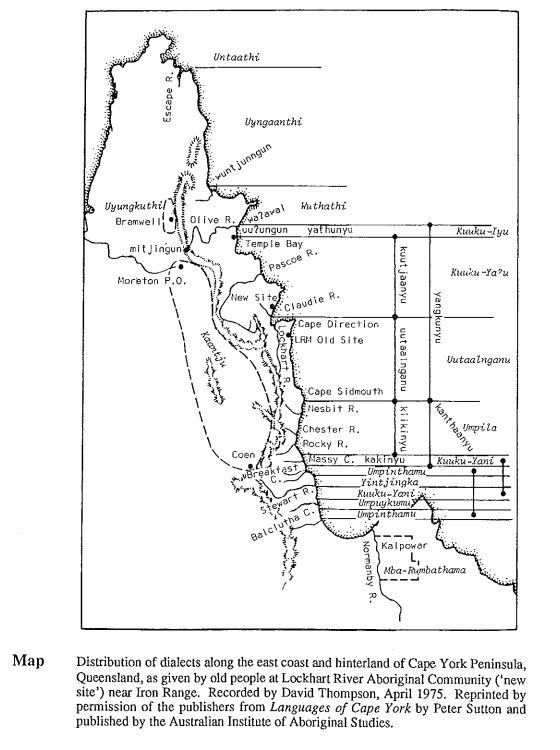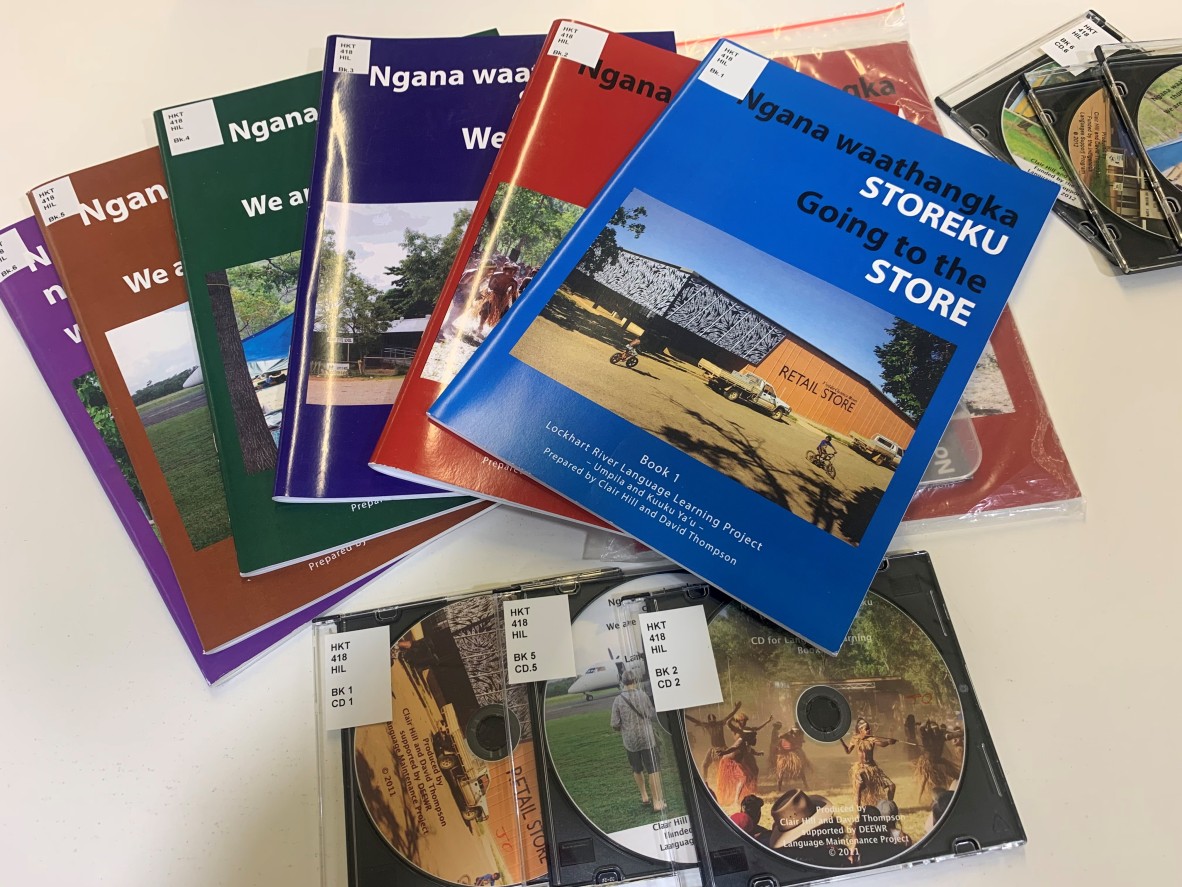Aboriginal and Torres Strait Islander people should be aware that this blog post contains images or names of Aboriginal people who have passed; this is not meant to cause distress or offence but raise awareness of our shared history and the story of Aboriginal and Torres Strait Islander languages across Queensland.
Welcome to Week Fifteen of the A-Z of Queensland Aboriginal and Torres Strait Islander languages!
This week's language of the week is Umpila, one of the languages of Eastern Cape York. Umpila is also known as Ompeila, Ompela, Oom-billa, Koko-umpilo, etc. According to Austlang, Umpila is a dialect complex which included at least six varieties before European settlement (Thompson 1988, in Hill 2011). Today, only three are still spoken Umpila, Kuuku Ya'u and Kaanju and only by a handful of speakers. Traditionally, Umpila was spoken in the Princess Charlotte Bay region extending north along the coastal plains towards Cape Sidmouth as shown in the following map by Thomson.

East Coast Cape York Languages, Thomson (1988).
Gold was discovered at Coen in the 1880's resulting in a rush of settlement accompanied by Native Police contingents based at McIvor (1886) and Coen (1888). This expansion saw the establishment of cattle stations with large Aboriginal camps for the workers. During this time period, Aboriginal men from Lockhart River and Lloyd Bay were recruited into Beche-de-mer, pearling and later sandalwood industries. Between 1907 and 1913, Chief Protector Howard pressed for a settlement at Lloyd Bay, in order to control the pearling and sandalwood operators, but without success.
In 1924 following the closure of Giblet's sandalwood, the Queensland Government formally gazetted an Aboriginal Reserve for the region. After several temporary locations at Orchid Point and Bare Hill, a permanent site was established at what is now known as 'Old Lockhart'. Superintendent Rowan ordered the removal of groups of Aboriginal people from different parts of Cape York to Lockhart River - these language groups included Umpila, Kaanju, Kuuku Ya'u, Uutaalnganu and Wuthathi. The present site of Lockhart River Aboriginal Community is located near the Iron Range Airport - people were moved there in 1970 due to water supply shortages.

Umpila and Kuuku Ya'u readers from Lockhart River. HKT 418 HIL
According to the National Indigenous Languages Survey (NILS) in 2005, there are less than a dozen known speakers, mainly living at Lockhart River Community. There are community revival efforts supported through AIATSIS and the Pama Language Centre. The Lockhart River Language Readers above, feature Umpila and Kuuku Ya'u language and were compiled by local community members with linguistic support by Clair Hill and David Thomson. The kit is held at the State Library and comprises six (6) storybooks and accompanying audio recordings in both languages.
State Library collections hold limited material on Umpila, notably published work by Thomson, Hale, Sutton and Rigsby. One of the more unusual texts is Pelletier: the forgotten castaway of Cape York which tells the story of a French cabin boy, Narcisse Pelletier, and his life with the Uutaalnganu people of north-east Cape York from 1858 to 1875. Pelletier's story was first published in France in 1876 and included some language words which are identified as mainly Uutalnganu with Umpila; the library holds a contemporary translation.
Join State Library for next week's Language of the Week - Wapabara from Great Keppel Island!
Desmond Crump
Indigenous Languages Coordinator, State Library of Queensland
State Library of Queensland Aboriginal and Torres Strait Islander Languages Webpages
State Library of Queensland Aboriginal and Torres Strait Islander Languages Map
Spoken: Celebrating Queensland languages exhibition
Jarjum Stories exhibition
Minya Birran: What next for Indigenous Languages?
Additional material for this blog post was drawn from the the Queensland Government Aboriginal and Torres Strait Islander Community Histories wepbages.
Images
Cover image: Aboriginal boys spearing fish at Lockhart River, Queensland, ca. 1930, John Oxley Library, Record number: 244265
East Coast Cape York Languages, Thomson (1988). J 499.15 THO
Lockhart River Language Readers, HKT 418 HIL
References and Further Reading
State Library collections have some material relating to Umpila language and people; including the following items.
Anderson, S. (2009) Pelletier : the forgotten castaway of Cape York. Introductory essay & translation by Stephanie Anderson; ethnographic commentary by Athol Chase. J 994.03 AND
Charles, B., Neuenfeldt, K. and Pegrum, N. (2006) Ba'il muzik Kincha Ngumpulungu songs from the East Coast Lockhart River. HCD 782.42162 BAI
Curr, E. M. (1887) The Australian Race: its origins, languages, customs, place of landing in Australia and the routes by which it spread itself over that continent. RBF 572.994 cur
Hercus, L. and Sutton, P. (1986) This is what happened: historical narratives by Aborigines. J 994.0049915 THI
Hill, C. and Thompson, D. (2012) Lockhart River language readers Umpila and Kuuku Ya'u languages. HKT 418 HIL
Omeenyo, G. (1987) The crocodile. JUV A823.3 ome
Roth, W. E. (1898-1903) "Reports to the Commissioner of Police and others, on Queensland aboriginal peoples 1898-1903." FILM 0714
Sutton, P. (ed) (1974) Languages of Cape York: papers presented to the Linguistic Symposium, Part B, held in conjunction with the Australian Institute of Aboriginal Studies Biennial General Meeting, May,1974. G 499.15 1976
Thomson, D. (1988) Lockhart River 'sand beach' language: an outline of Kuuku Ya'u and Umpila. J 499.15 THO
Tindale, N. B. (1974) Aboriginal tribes of Australia: their terrain, environmental controls, distribution, limits and proper names. Q 994.0049915 tin
Weblinks
Australian Institute of Aboriginal and Torres Strait Islander Studies (AIATSIS)
Comments
Your email address will not be published.
We welcome relevant, respectful comments.